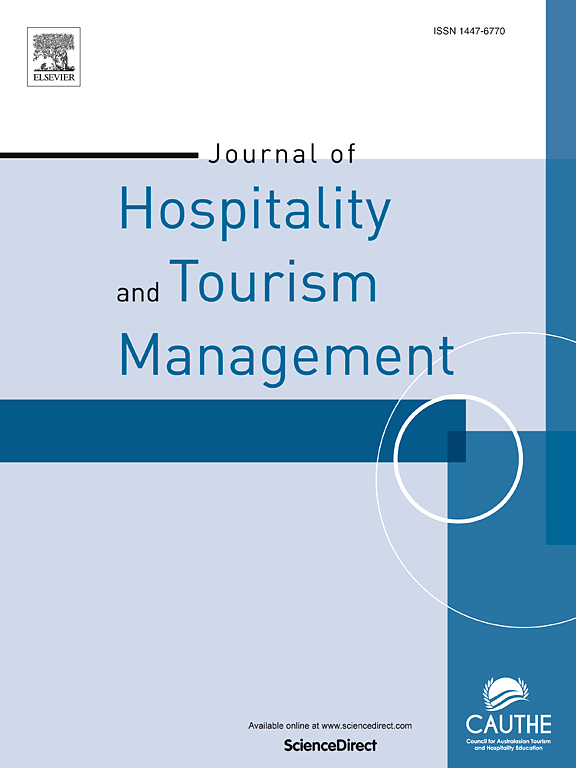情境化酒店职业行为:测试社会文化和组织职业模式
IF 7.8
1区 管理学
Q1 HOSPITALITY, LEISURE, SPORT & TOURISM
引用次数: 0
摘要
本研究运用社会认知职业理论(SCCT)开发并实证检验了加纳酒店职业结果的情境模型,重点关注社会和组织因素如何影响员工的职业态度和意图。利用769名酒店一线员工的调查数据,采用偏最小二乘结构方程模型(PLS-SEM)对测量模型和结构模型进行评估。结果表明,主观规范对职业态度有显著的正向影响。变革型领导不仅强化了员工的职业态度和职业意向,而且调节了主观规范与职业态度之间的关系,放大了它们的积极作用。此外,良好的职业态度强烈地预测了员工的职业意向,强调了培养积极的感知对提高员工承诺的重要性。研究结果对酒店和旅游业(H&;T)行业具有实际意义,特别是在集体主义(如非洲和亚洲国家)和个人主义(如美国、澳大利亚、加拿大和欧洲)背景下。从理论上讲,本研究通过整合酒店行业内的情境影响和强调变革型领导的调节作用来扩展SCCT。本研究也为进一步探讨职业发展规划、组织承诺、心理契约等因素对职业发展结果的影响提供了基础。本文章由计算机程序翻译,如有差异,请以英文原文为准。
Contextualising hotel career behaviour: testing a sociocultural and organizational career model
This study applies Social Cognitive Career Theory (SCCT) to develop and empirically test a contextual model of hotel career outcomes in Ghana, focusing on how social and organizational factors shape employees' career attitudes and intentions. Drawing on survey data from 769 frontline hotel employees, Partial Least Squares Structural Equation Modeling (PLS-SEM) was employed to assess both the measurement and structural models. The results reveal that subjective norms significantly and positively influence career attitudes. Transformational leadership not only strengthens employees' career attitudes and intentions but also moderates the relationship between subjective norms and career attitudes, amplifying their positive effect. Additionally, favourable career attitudes strongly predict employees' career intentions, underscoring the importance of cultivating positive perceptions to enhance employee commitment. The findings offer practical implications for the hospitality and tourism (H&T) industry, particularly across collectivist (e.g., African and Asian countries) and individualist (e.g., U.S., Australia, Canada, and Europe) contexts. Theoretically, the study extends SCCT by integrating contextual influences within the hotel industry and highlighting transformational leadership's moderating role. It also provides a foundation for future research to explore other contextual factors such as career development programs, organizational commitment, and psychological contracts in shaping career outcomes.
求助全文
通过发布文献求助,成功后即可免费获取论文全文。
去求助
来源期刊
CiteScore
13.30
自引率
8.40%
发文量
177
审稿时长
45 days
期刊介绍:
Journal Name: Journal of Hospitality and Tourism Management
Affiliation: Official journal of CAUTHE (Council for Australasian Tourism and Hospitality Education Inc.)
Scope:
Broad range of topics including:
Tourism and travel management
Leisure and recreation studies
Emerging field of event management
Content:
Contains both theoretical and applied research papers
Encourages submission of results of collaborative research between academia and industry.

 求助内容:
求助内容: 应助结果提醒方式:
应助结果提醒方式:


